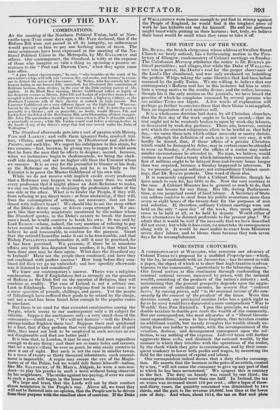THE FIRST DAY OF THE WEEK.
DR. BUR:4S, the Scotch clergyman whose address at Swallow Street Church we lately noticed, has a forthcoming motion in the Pres- bytery of Glasgow, condemnatory of Cabinet meetings on Sunday. The Caledonian Mercury attributes the notice to Dr. BURNs'S po- litical partialities; and alleges, that while the Duke of WELLING- TON was in power, the Doctor's zeal for the proper observance of
the Lord's Day slumbered, and was only awakened on beholding the profane Whigs taking the same liberties that had been before assumed by the godly Tories. We are willing to believe that our contemporary's Reform zeal has in this instance led him to attri- bute a wrong motive to the worthy divine; and the rather, because, though his is the only motion on the journals, we have heard the practice of which he complains censured by several persons who are neither Tories nor bigots. A few words of explanation will perhaps go farther to convince these that their blame is misapplied, than an imputation of evil motives will.
It is a wholesome doctrine laid down by all Christian churches, that the first day of the week ought to be kept sacred,—that its rest ought not to be wantonly broken in upon by week-day labours, or desecrated by week-day pastimes. There are, however, certain acts which the strictest religionists allow to be lawful on that holy day,—we mean those acts which either necessity or mercy dictate.
Now, although the definition of such acts is not very easy, it will hardly be denied, that, if those affairs of a private Christian
which would be damaged by delay, may in certain cases be attended
to even on Sunday, a fortiori the affairs of a nation may under similar circumstances be attended to. No man, we believe, would
venture to assert that a treaty which intimately concerned the wel- fare of millions ought to be delayed four-and-twenty hours longer than was required, because a Sunday happened to intervene. It is, we presume, against ordinary, not extraordinary Cabinet meet- ings, that Dr. BURNS protests. One word of these also. It is commonly supposed that a Cabinet Minister, though he have much to care for, has little to do. Now the very contrary is the case. A Cabinet Minister has in general so much to do, that lie has not leisure for any thing. His life, during Parliament- time, is one perpetual round of hard labour. A Secretary of State can seldom contrive to steal from his public avocations more than seven or eight hours of the twenty-four for the purposes of rest and refection. If, therefore, ordinary Cabinet meetings were not held on the only " open day" of the week, they must, perforce, cease to be held at all, or be held by deputy. Would either of these alternatives be deemed preferable to the present plan ? We admit that it would be well if the necessity that we have described did not exist; but while it does exist, we must take its consequenceS along with it. It would be most unfair to exact from Ministers seven days' labour, and to blame them because they took seven days for its accomplishment.


























 Previous page
Previous page